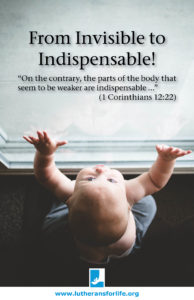by Pastor Michael Salemink
 “On the contrary, the parts of the body that seem to be weaker are indispensable” (1 Corinthians 12:22).
“On the contrary, the parts of the body that seem to be weaker are indispensable” (1 Corinthians 12:22).
Human nature evaluates a person’s worth by age, appearance, or ability. It’s a sinful and selfish assessment: “For the Lord sees not as man sees: man looks on the outward appearance, but the Lord looks on the heart” (1 Samuel 16:7).
Our culture sometimes finds unborn children to be invisible. They are little, located out of sight, less developed than others, and rely on someone else for survival. We may also treat elderly neighbors as invisible when they do not appear to contribute what we value to society or even care for themselves. And we often overlook those who struggle with surprise pregnancies, post-abortion grief, chronic disability, or terminal diagnosis. We would rather they remain invisible than have their suffering highlight our own unsightly mortality. Indeed, maybe it’s not anything about them but something about us that makes them invisible: our pride, our apathy, our idolatries.
Yet our Heavenly Father sees each of them, just as He beholds all of us. He creates them special. He redeems them precious. He calls them priceless. He enjoys and employs everyone in His plan and reign. Indeed, they are indispensable to His creation and His kingdom, as are all of us. He Himself has taken “the form of a servant” (Philippians 2:6-8)—just such an invisible one—to intercede and forgive and save. Jesus Christ has made every human life indispensable.
And He has given them to us as gifts and privileges with whom we may share all of the blessings He abundantly bestows. The human race, and particularly the body of Christ and family of God, is magnificent precisely because we share joys and sorrows. One is strong where another is weak, and we need each other, and we have each other—even (and perhaps especially) when we are the least of these.
What we perceive as defects God may in fact intend as features!